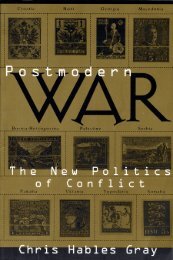Postmodern Wars Imaginary and Real: World War III - Chris Hables ...
Postmodern Wars Imaginary and Real: World War III - Chris Hables ...
Postmodern Wars Imaginary and Real: World War III - Chris Hables ...
You also want an ePaper? Increase the reach of your titles
YUMPU automatically turns print PDFs into web optimized ePapers that Google loves.
[ 156 ] The Past<br />
when the cost seemed too high or the gain too small for the empire builders.<br />
But seldom could primitive warfare defeat modern armies.<br />
In the modern era resistance to Western expansion was tenacious, often<br />
lasting hundreds of years. However, with very few exceptions (Haiti, Ethiopia,<br />
Afghanistan, Japan) the West always triumphed eventually. These wars<br />
were marked by the use of surrogate forces, the effective deployment of new<br />
technologies, <strong>and</strong> incredible moral license. In many cases genocide was the<br />
strategy for victory. These colonial conflicts were called "imperfect wars."<br />
Capt. Bernardo De Vargas Machuca, who campaigned in Chile, wrote<br />
the first manual on combatting guerrilla warfare in 1599. He advocated using<br />
comm<strong>and</strong>o groups on extensive search-<strong>and</strong>-destroy missions of up to two<br />
years to exterminate the Indians. Native tactics, such as living on the l<strong>and</strong>,<br />
ambush, <strong>and</strong> surprise attacks, were to be employed by the Spanish as part of<br />
their strategy of extermination. Such wars ended with an extended manhunt<br />
as the last "wild" Indians were tracked down with dogs <strong>and</strong> killed in cold<br />
blood (Parker, 1988, p. 120). Bloodhounds were still being used to track<br />
Indians as part of a successful strategy in the Florida wetl<strong>and</strong>s <strong>and</strong> California<br />
hills in the nineteenth century.<br />
But at the end of <strong>World</strong> <strong>War</strong> II a sea change took place. Colonialism<br />
was suddenly collapsing under political <strong>and</strong> military pressures that ranged<br />
across the spectrum from satyagraha (the "truth force" of Moh<strong>and</strong>as K.<br />
G<strong>and</strong>his independence movement) through voting to violence. Part of the<br />
great rollback of colonialism was because of the obvious superiority, for the<br />
West, of neocolonialism, as exemplified by the United States's domination<br />
of Latin America <strong>and</strong> the Philippines. Other nations thrust off European<br />
sovereignty only by ceding some measure of control to regional powers or to<br />
the so-called Second <strong>World</strong>. The Communist bloc certainly did not lead<br />
countries to liberation, but it helped create a space for room to maneuver, if<br />
not real independence (Chali<strong>and</strong>, 1978). This is seen most clearly in the case<br />
of war. Consider the spectrum of allies the Vietnamese mobilized: Sweden,<br />
China, the USSR, <strong>and</strong> large parts of the international peace movement.<br />
While modern war was developing toward total war, it was often<br />
challenged by irregular war. When Western armies met each other, they<br />
fought modern wars, but when they went to war against other people it was<br />
a more limited struggle, from the point of view of the Europeans. They called<br />
it insurrection, revolution, guerrilla war, tribal revolt, rebellion, uprising,<br />
police action, little war, imperfect war, colonial war, <strong>and</strong> limited war. These<br />
wars were only limited on one side. For the nonindustrialized societies they<br />
were total wars sure enough, often leading to the destruction of whole<br />
cultures <strong>and</strong> the genocide, or near genocide, of entire peoples. <strong>Postmodern</strong><br />
war has imposed the framework of "minor" wars onto all conflicts, even those<br />
between the great powers. This came as something of a surprise to them,<br />
witness the stalemate called the Korean <strong>War</strong>.








